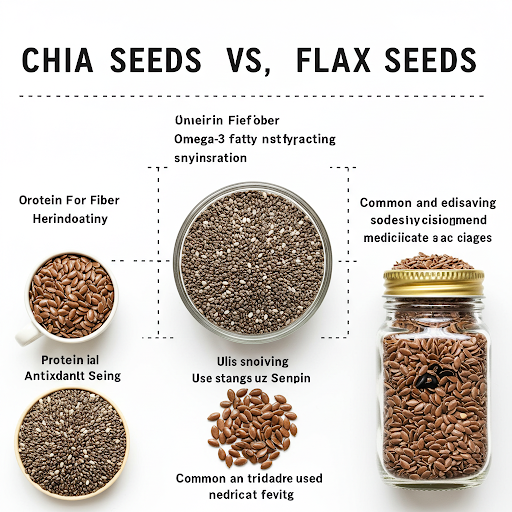Introduction
Superfoods stay trendy because folks want easy fixes for better eating plus wellness. Chia seeds, along with flax seeds, pop up often – they’re small but pack a punch when it comes to good stuff your body loves. Sure, they’re alike in some ways, yet both bring something different to the table, so tossing either into your meals makes sense.
Chia seeds come from the Salvia hispanica plant; they’re now popular because they pack lots of nutrients while being simple to add to food. Flax seeds, taken from Linum usitatissimum, have been valued for ages thanks to their health perks. Here’s how these two stack up in terms of nutrition – alongside real-life tips on using them every day.
Understanding Chia Seeds
Chia seeds have been eaten for ages – prized back then by Aztec and Maya folks because they kept energy levels up. Nowadays, people still love them since they pack so many key nutrients inside.
Chia seeds pack a solid dose of omega-3s – good for your heart and can calm body-wide irritation. Besides that, they’re loaded with fiber, helping keep your digestive system running smoothly while keeping hunger at bay from time to time.
Folks on plant-only eats often like chia seeds ’cause they pack decent protein. These tiny bits bring key nutrients – calcium, magnesium, phosphorus – that help keep bones solid, muscles moving, plus fuel the body’s engine.
Besides being packed with nutrients, chia seeds may help balance blood sugar, support gut health, or boost endurance throughout the day. Since they don’t have a strong taste and soak up moisture well, you can toss them into anything – morning meals, snacks, or even desserts without changing the original taste.
Understanding Flax Seeds
Flax seeds have grown widely over ages, still ranking among the most nutrient-packed plants you can eat. What stands out? Their sky-high amounts of ALA – a kind of omega-3 tied to heart support and calming body-wide swelling.
Flax seeds stand out because they’re packed with lignans – natural substances that act like antioxidants while helping balance hormones. Because of this, they might boost your immunity, which in turn could help guard your body over time.
Flax seeds pack plenty of fiber – this keeps your digestion running smoothly. When it comes to nutrients, they deliver magnesium along with phosphorus; both support how your body uses energy. Copper shows up here too, working behind the scenes in nerve signaling. Vitamin B1 joins the mix, helping turn food into fuel without fuss.
Every now and then eating flax seeds may support a healthier heart, help hormones stay on track, or aid your gut. Once crushed, they mix well into desserts or meals with bold flavors – so tossing them in can quietly lift the nutrition of lots of dishes.
Chia Seeds vs. Flax Seeds: A Nutritional Comparison
Omega-3 Fatty Acids
Flax seeds pack a stronger punch when it comes to ALA omega-3s compared to chia. Though chia isn’t far behind, delivering decent levels too. For people aiming to up their omega-3 game, flax usually wins out. Still, both can play a solid role in daily nutrition.
Fiber
Chia seeds are packed with soluble fiber – this stuff turns into a gooey mix when wet, helping your stomach feel full plus work smoothly. On the flip side, flax seeds offer soluble and also insoluble fiber, keeping things moving in your gut while boosting general digestion.
Each one’s great if you’re looking to get more fiber.
Protein
Chia seeds pack a bit more protein compared to flax, so they’re solid for folks wanting plant-powered nutrition.
Vitamins and Minerals
Chia seeds pack extra calcium along with magnesium; meanwhile, flax brings more vitamin B1 plus some specific trace minerals.
Folks who add these two seeds to their meals tend to get a wider mix of nutrients overall.
Which Is Better?
The decision hinges on what you want – depends on your aims, really
Grab flax seeds if you want more omega-3s
Need extra protein or gel-like fiber? Try chia seeds instead
When it comes to digestion → each one helps just fine
Chia seeds are ready to eat right away – no need to grind them first. They work instantly when you toss ’em into meals or drinks
Incorporating Chia Seeds into Your Diet
Chia seeds? Super simple to work with – no need to grind them, plus they soak up way more liquid than you’d expect.
Ideas for Use
Chia pudding: Stir chia seeds into any drink you like, leave it in the fridge all night – gets thick, packed with good stuff.
Blend a spoon into your drink – gets you more fiber, also boosts protein, plus adds healthy fats.
Top your greens with these – or mix into a DIY dressing – to boost crunch and nutrients.
Tips
Let chia seeds sit in liquid to help your gut work better while boosting how much nutrition you get.
Try mixing chia seeds with water instead of eggs when you bake – it works great for plant-based recipes.
Incorporating Flax Seeds into Your Diet
Flax seeds work in tons of dishes – though grinding them helps your gut grab every nutrient. While tossing whole ones into food seems fine, breaking them down actually unlocks what your body needs. Even if it feels like extra effort, that little grind makes a real difference when you eat.
Ideas for Use
Try flaxseed muffins – toss ground flax into your batter to boost fiber along with good-for-you fats.
Shake it up: toss a spoonful into your go-to blend – adds richness plus a kick of omega-3s.
Cereals plus baked items: Stir them into oats, flapjacks, crunchy clusters, or DIY loaves to boost nourishment.
Tips
Crush flaxseeds first – this helps your body absorb more nutrients.
Keep them in the fridge so the natural oils don’t go bad.
Conclusion
Chia seeds pack a solid dose of protein, calcium, plus gooey fiber that helps digestion. On the flip side, flax shines when it comes to omega-3s, plant chemicals called lignans, along with stuff that backs up hormones. Depending on what you’re aiming for health-wise, one might suit you better. Still, using both now and then adds variety to how you feel and eat.
They’re flexible – try tossing them into shakes, muffins, oats, greens, or whatever’s handy. Tossing in these two power foods boosts your nutrition while keeping things tasty and low-effort.




